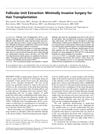 1 citations,
January 2009 in “CRC Press eBooks”
1 citations,
January 2009 in “CRC Press eBooks” Finasteride increases hair count and improves hair growth with low risk of side effects.
 1 citations,
January 2009 in “Cochrane Database of Systematic Reviews”
1 citations,
January 2009 in “Cochrane Database of Systematic Reviews” Review determines effective, safe treatments for female hair loss.

The combined treatment increased hair density in most patients with Androgenetic Alopecia.
 April 2024 in “ScienceRise. Pharmaceutical science”
April 2024 in “ScienceRise. Pharmaceutical science” Men with hair loss feel it affects their emotions and life quality, and want more effective treatments.
 April 2024 in “Journal of dermatology research reviews & reports”
April 2024 in “Journal of dermatology research reviews & reports” Using a laser helmet with Minoxidil works better for male hair loss than Minoxidil alone, with no extra side effects.

Early-onset baldness is linked to genetics, lifestyle, and can indicate higher risk for heart and metabolic diseases, and affects mental health.
 June 2023 in “Trichology and cosmetology:”
June 2023 in “Trichology and cosmetology:” Ageratum Conyzoides, when taken orally, can effectively reduce hair loss and improve hair growth.

People with androgenic alopecia are more likely to have metabolic syndrome than healthy individuals.
 January 2018 in “Elsevier eBooks”
January 2018 in “Elsevier eBooks” The document concludes that alopecia has significant social and psychological effects, leading to a market for hair loss treatments.
 March 2017 in “The American Journal of Cosmetic Surgery”
March 2017 in “The American Journal of Cosmetic Surgery” Transplanted hair follicles can resist hair loss from an autoimmune condition better than natural hair.
 February 2012 in “Expert Review of Endocrinology & Metabolism”
February 2012 in “Expert Review of Endocrinology & Metabolism” The document suggests more research is needed to understand the link between baldness and prostate cancer.
 August 2001 in “Dermatologic Surgery”
August 2001 in “Dermatologic Surgery” The KNU implanter for hair transplants showed a high survival rate of 90%+ for transplanted hairs after 6 months, with benefits like natural hair direction and fewer scars.
 August 2023 in “International Ayurvedic medical journal”
August 2023 in “International Ayurvedic medical journal” Improper diet, lifestyle, and stress are major causes of hair fall.
 February 2021 in “Journal of pharmaceutical and biological sciences”
February 2021 in “Journal of pharmaceutical and biological sciences” No cure exists for alopecia areata, and treatments are personalized.
 January 2012 in “Elsevier eBooks”
January 2012 in “Elsevier eBooks” Hair loss can cause emotional and social issues, and various treatments, including medication, surgery, and psychological support, are needed.
 March 2021 in “PARIPEX INDIAN JOURNAL OF RESEARCH”
March 2021 in “PARIPEX INDIAN JOURNAL OF RESEARCH” Microneedling combined with platelet-rich plasma therapy is more effective for hair regrowth in androgenic alopecia than microneedling alone, but it's more painful.
 January 2021 in “Esculapio”
January 2021 in “Esculapio” Using your own blood (PRP) can effectively increase hair count and strength in men with hair loss.
 July 2020 in “Journal of Cosmetic and Laser Therapy”
July 2020 in “Journal of Cosmetic and Laser Therapy” Using your own platelet-rich plasma (PRP) can effectively treat hair loss, increasing hair density and width with no side effects.
 March 2019 in “European archives of medical research”
March 2019 in “European archives of medical research” Platelet-rich plasma injections are a cheap and effective way to reduce hair loss and improve hair quality in people with mild to moderate androgenetic alopecia.
 January 2016 in “Ankara Üniversitesi Tıp Fakültesi mecmuası”
January 2016 in “Ankara Üniversitesi Tıp Fakültesi mecmuası” Severe hair loss (androgenetic alopecia) is linked to higher risk of heart disease (cardiovascular atherosclerosis).
 January 2009 in “Egyptian Journal of Medical Human Genetics”
January 2009 in “Egyptian Journal of Medical Human Genetics” The study suggests that a specific gene variation and higher gene activity are linked to increased baldness in Egyptian men.
 226 citations,
September 2001 in “Journal of The American Academy of Dermatology”
226 citations,
September 2001 in “Journal of The American Academy of Dermatology” Hair loss in women is genetic, diagnosed by examination and biopsy, and treated with minoxidil, finasteride, or transplantation.
 215 citations,
November 2006 in “Journal of The American Academy of Dermatology”
215 citations,
November 2006 in “Journal of The American Academy of Dermatology” Dutasteride more effective for hair growth, but has more side effects than finasteride.
 209 citations,
September 2008 in “Dermatologic Therapy”
209 citations,
September 2008 in “Dermatologic Therapy” Androgens can both increase and decrease hair growth in different parts of the body.
 198 citations,
October 2011 in “Journal der Deutschen Dermatologischen Gesellschaft”
198 citations,
October 2011 in “Journal der Deutschen Dermatologischen Gesellschaft” Use minoxidil for hair loss; finasteride and dutasteride for men, dutasteride for women.
 164 citations,
January 2014 in “Journal of Cutaneous and Aesthetic Surgery”
164 citations,
January 2014 in “Journal of Cutaneous and Aesthetic Surgery” PRP injections increase hair density and satisfaction in androgenetic alopecia patients.
 157 citations,
April 1994 in “Clinical endocrinology”
157 citations,
April 1994 in “Clinical endocrinology” Androgens can cause hair growth in some areas and hair loss on the scalp.
 153 citations,
August 2002 in “Dermatologic Surgery”
153 citations,
August 2002 in “Dermatologic Surgery” Follicular Unit Extraction (FUE) is a less invasive hair transplant method with minimal scarring, suitable for about 60% of patients, especially those needing fewer grafts and quicker recovery.
 151 citations,
August 2010 in “British Journal of Dermatology”
151 citations,
August 2010 in “British Journal of Dermatology” Guidelines for diagnosing common hair loss include detailed history, clinical examination, and various diagnostic techniques.
 145 citations,
November 2017 in “Journal of The European Academy of Dermatology and Venereology”
145 citations,
November 2017 in “Journal of The European Academy of Dermatology and Venereology” Use minoxidil for hair loss treatment; assess results after 6 months.






























